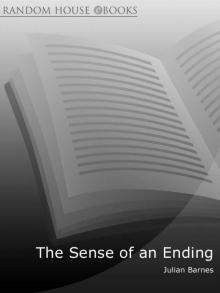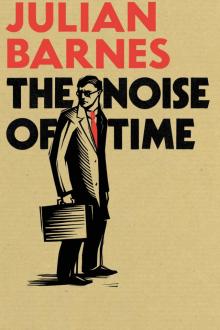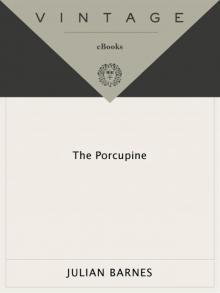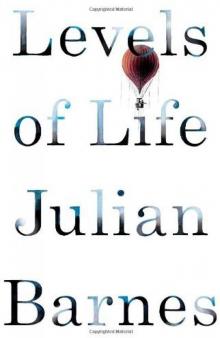- Home
- Julian Barnes
Something to Declare Page 22
Something to Declare Read online
Page 22
In his very last letter to his old troubadour, Flaubert's intransigence suddenly appears less granitic. He tells her that he is “not as obstinate as you think,” and predicts that she will recognize her “direct influence” on the story he is currently writing, Un Coeur simple: “I believe you will like the moral tendency, or rather the underlying humanity, of this little work.” After her death he wrote to Maurice Sand: “I began Un Coeur simple exclusively for her, solely to please her. She died when I was in the middle of my work. Thus it is with all our dreams.” It is a fine and famous literary compliment, though we should allow for Flaubert's innate gallantry: he once claimed that he wrote L'Education sentimentale “to please Sainte-Beuve.” Nor does the Correspondance provide any further corroboration of Sand's supposed influence.
We also need to check the author's amicable declarations against the work itself. It is true that a Sandian reading is loosely possible if you half-close your eyes: here is a tale of ordinary, near-contemporary life about a simple, good-hearted woman who serves others and believes in God. Remove this deliberate soft focus, however, and you see one of the grimmest and most relentless stories ever written, about a downtrodden, ignorant, exploited servant who is ruthlessly stripped of every single person, living thing, or object to which she becomes attached. Her existence is a Calvary of loss, and ends with a deathbed scene whose potential Sandian poignancy is weather-clouded by the Flaubertian grotesque—the monumental, cruel grotesque, as a stuffed parrot, reanimated and gigantized, does service for the Holy Ghost. Unless you believe (and the story does not invite you to) that Féli-cité's sufferings will be rewarded in Heaven, or that they are somehow a good in themselves, the “moral tendency” of Un Coeur simple is unsparingly bleak. The work it lies closest to, in its tone and its machine-like unrolling, is Madame Bovary. Truly, its author could not change his eyes.
Flaubert's and Sand's Correspondance begins with a small misunderstanding. Sand has received a pressed plant in an envelope with no name on the back, and wonders if the handwriting might be Flaubert's. No, he replies, though curiously enough at about the same time someone had sent him an equally anonymous leaf. (The identity of the horticultural donor or donors remains unsolved.) Three years later, when Sand visits Croisset for the first time, she intends to take away as a souvenir some leaves from a tulip tree— “I need them for arcane purposes”—but forgets them. He brings the leaves up to Paris a few days later, but fails to find her in. Later that year, when the Seine floods, she enquires after the health of the tree. She mentions it again in her diary in 1868, in a letter of 1869, and for the last time (“Tell me whether the tulip tree suffered from the frost this winter”) in April 1871.
The tree, like the house at Croisset, has long since disappeared, but arboreal antiquarians who visit George Sand's grave at Nohant can still stand under the yew tree which was growing there when Flaubert helped bury his old friend on 10 June 1876. A fine rain was falling and the mud was ankle-deep. Flaubert wrote to Turgenev, who was in Russia, that Sand's funeral “was like a chapter in one of her books.” He reported that he had wept like a calf (“twice,” he specified, with unnerving if characteristic precision). To Sand's son Maurice, Flaubert wrote, in the fraternity of grief, that he felt as if “I was burying my mother a second time.” The two women had, after all, offered him a similar rebuke. In one of her last letters Sand, defending the eighteenth-century comic dramatist Sedaine, complained to Flaubert that “you look only for the well-turned phrase.” Twenty-one years previously, when he was still struggling with Madame Bovary, his mother had told him that “your mania for sentences has dried up your heart.” Flaubert, good-naturedly, considered her remark “sublime.”
(14)
Tail-Flaying
A bad sight for Flaubert: Prussians in the studio of a Rouen photographer, 1871
In the late autumn of 1875, Flaubert spent six weeks at Concarneau with the naturalist Georges Pouchet. While his friend dissected fish and molluscs, Flaubert took daily sea-baths, gorged himself on lobster, eavesdropped on the table talk of a sardiners' club— confirming yet again the “bottomlessness of human stupidity”— and wrote to his friends. His morale is extremely low, his financial state parlous, his health poor, his brain worn out. He has put aside Bouvard et Pécuchet as being too difficult. “The good days are over,” he writes to Turgenev. “The end of my life is no joke,” he tells Edma Roger des Genettes. He likens himself, in a letter to his niece Caroline, to a piece of dead seaweed, torn from its moorings and blown aimlessly about. Caroline urges a more stoical seaside comparison upon him: he must be like a rock. It is unwise to bandy metaphors with Flaubert; she should know, he tells her in reply, that old granite often breaks down into layers of clay. Even more candidly, he tells Edmond de Goncourt that he awaits the first sign of some mortal illness with impatience. Goncourt knows him well enough, he adds, to realize that “This is not a pose!”
The fourth volume of the Pléiade Correspondance covers the period 1869–75, seven years that are the great wailing hinge of Flaubert's existence. There is a cruel structure and movement to this penultimate volume of the novel of his life. It opens with Flaubert, publicly and privately, the mature, successful, industrious, and social being he frequently proclaims he isn't. He is completing L'Education sentimentale, and just beginning, he thinks, to understand what a novel could be; he is assiduous at Princesse Mathilde's salon, rather preening himself on his insider status; he is also engaged on one of those pieces of socio-political scheming—to get Caroline's husband, Ernest Commanville, named Prussian vice-consul in Dieppe—which he has considerable taste for, and imagines himself good at. (The record is incomplete, but it somehow seems typical that if this was what Flaubert was manoeuvring for, Commanville ended up as vice-consul for Turkey instead.) Apart from the regular vast irritants to a man of his sensibility—critics, newspapers, politics, progressives, Parisians, provincials, Nature—the world is as satisfying a place as it might be. “1869,” he predicts to the Princesse in June of that year, “will have been a good year for me.”
The novelist should have known about dramatic irony: 1869 was precisely the starting-point of a catastrophic decade filled with deaths, illness, financial ruin, precipitate old age, and thunderously intrusive History. Less than five weeks after his blithe prediction, he was writing again to Princesse Mathilde to report the death of Louis Bouilhet, the friend he variously described as half his brain, his literary compass, and his left testicle. The mixed reception given to L'Education sentimentale later that year hinted that Flaubert would never again repeat the success of Madame Bovary or Salammbô. The Franco-Prussian War tore at his view of France (and Prussia). Jules Duplan, his closest friend after Bouilhet, died in 1870, followed by Sainte-Beuve (his most important critical supporter), Jules de Goncourt (whose death reduced to three the original seven Magny diners), Gautier, and Ernest Feydeau. His mother died in 1872. Finally, the collapse of European timber prices ruined Commanville and with him, effectively, Flaubert.
After such battering, his health, always fragile, cracks; in these pages he suffers from rheumatism, angina, eczema, swollen glands, dysentery, gout, and the continuing effects of syphilis. Looking back, he judges that he was always afraid of life; he envies other professions, other ways of living; he suffers child-regret. His existence has been arid, “laborious and austere.” But a man is not master of his destiny: life just pushes you along, until one day you find yourself in a hole, with nothing to be done about it, and you stay there, all alone, waiting for “the definitive hole.”
“Since happiness is impossible in this world,” he tells Elisa Schlesinger in 1872, “we must strive for serenity.” This is one of the insistent themes of the years 1869–75. But striving for serenity has the same internal contradiction as practising spontaneity. Nevertheless, Flaubert does his best—that best naturally consisting largely of words, of assurances to himself and to others. “I must be philosophical,” he repeatedly declares; yet he never had the tempera
ment of a philosopher. “I pass from exasperation to prostration, then I rise from annihilation to rage, so that my mean emotional temperature is a state of annoyance.”
George Sand was surely right in suspecting that his irritation was, increasingly, “necessary to his organization.” (Flaubert himself tells Goncourt that indignation is the stick which holds up the doll: “If I weren't indignant, I would fall down flat.”) But its tonality is not unmitigatedly splenetic or valetudinary. Flaubert's trip to Switzerland in 1874, for instance, is one long, exhilarating display of comic rage. It's serious, too, which makes it the more comic. Like his stay at Concarneau—and one with Caroline at Bagnères-de-Luchon—this had both a medical and a morale-boosting aim. “The theory,” he writes sceptically, “is that the lower barometric pressure will relieve my congestion by driving the blood into the lower organs.”
His three weeks on Mount Righi make up probably the least calming rest cure any human being has ever taken. For a start, he can't understand a country which doesn't have any real history. Then there is the omnipresence of Nature, which crushes him without inspiring thought. Then there is the problem of boredom, which he assaults by eating, drinking, and smoking a lot. But these activities depend upon the presence of waiters, who here are dressed in black even from early morning, so that they look like guests at your own funeral. “Eight days here,” he cries, “are like three centuries.” Then there are the other people, the dreadful Germans and the dreadful English, who make him want to hug a cow for some human contact. His unimpressable eye falls on jaunty tourists wielding sticks branded with the names of sites they have visited; a woman who plays Chopin on the hotel piano “in such a way as to make all the cows of Switzerland flee”; and the cretin installed at the telescope on the hotel balcony, with his arse pushed out and his hat on the back of his head, uttering imbecilities about the view. Switzerland, he concludes, is only any good for “botanists, geologists and honeymooners”—into none of which categories he falls. Sand rebukes him for his disobliging observations: “You're not a man of nature. So much the worse for you … We are nature, we're in nature, made by nature, made for nature.” But Turgenev can be relied upon for support in most things, and agrees about the Swiss. Despite living among such sublimities, they are “the most deeply boring and the least gifted people I have ever met. Whence cometh such an anomaly, as the philosopher might ask? Or is it perhaps not an anomaly at all? What would Bouvard and Pécuchet say about the matter?”
Flaubert's signatorial nicknames during this period give evidence of his mood. He still remains “Ton Géant” (though on one occasion “GEANT Aplati”—“Flattened GIANT”), but is increasingly “Ton Vieux.” When between these moods he is “Ton Excessif.” One characteristic way of being Excessive was in a competitiveness about sensibility and experience, a trait which becomes more apparent in these painful years. He has, he tells Caroline, “an exasperated sensibility and a deplorable imagination.” “What merely scratches others,” he tells Sand, “rips my flesh.” Hence his constitution is more adapted for pain than for pleasure. And hence his pain is greater than that of others. Throughout the events of 1870–i, he constantly assures correspondents that he is suffering more than anyone else in France. “Others are more to be pitied,” he writes, “but no one suffers as much.” It seems plodding to point out that a person of lesser sensitivity might suffer more if the damage inflicted upon them were greater. Neither Flaubert nor any of his family saw action or had anyone close to them killed. Nor did the writer suffer significantly from the invasion; the Prussians, he admits, “respected my study,” when they occupied Croisset, even if they did commit the Teutonic solecism of leaving their helmets on his bed.
It is the same when his mother dies; he tells Léonie Brainne that since he has the nerves of a flayed man, the loss has caused him more suffering than it would anybody else. He even tells George Sand—of all people—that he has “loved more than anyone” (though he does immediately add that the phrase is pretentious). It is hard to know what to make of this trait. Genuine conviction, raw competitiveness, poetic fallacy (when it comes to taking the suffering of France upon himself), or failure of imaginative sympathy? All four at the same time? Goncourt in his Journal noted Flaubert's “craziness” in imagining that he had done and suffered more than others, and characteristically recorded two of its more risible manifestations. The first has Flaubert getting into a fight with the sculptor Jacquemart over which of them had been host to more lice in Egypt—which of them, as Goncourt cattily put it, was “superior in vermin.” On another occasion, laddish talk in the smoking-room at Princesse Mathilde's turned to the lectoral sex-aids of their youth. Many cited Amours du chevalier de Faublas, an erotic tale of the late 1780s, as the text which invariably did the trick. Flaubert declared that he personally had never been able to finish it; for him, the key volume had been Meursius's Aloysiae (that is to say, Aloysiae Sygeai satira sotadica de arcanis Amoris et Veneris of 1658). “How superior, how special,” an irritated Goncourt comments. “Only something in Latin could make him hard.” In Flaubert's defence, he was not always so scholarly. While he was staying in Concarneau, Léonie Brainne sent him her portrait; he told her in reply that, lying in bed one morning and contemplating her image, he had become aware that he was still a man.
Solitary, melancholic, hypersensitive, high-minded, competitive, exasperated, impractical: how should such a temperament best be managed? The forty-seven-year-old bachelor of the start of this volume, living at home with his mother and servants, and lacking most financial restraints, can exist with as much contentment as such a personality might allow; the fifty-year-old whose mother has just died, precariously inhabiting a house now belonging to his niece, and with his finances tied to those of the Commanvilles, finds yet another form of suffering thrust upon him: domestication. Even Flaubert was not competitive about his home-making skills. The solution was self-evident, especially to women, especially to George Sand: Flaubert should marry. The recalcitrant bachelor regards this as not just a hopeful, but a fantastical misreading of his character. Flaubert has long observed the state of matrimony: his married (male) friends, he writes, do nothing but work, hunt, and play whist; none will read poetry with him. A quarter of a century previously, Flaubert had regarded the marriage of his childhood friend Alfred Le Poittevin as a personal and artistic betrayal; over the years his opinion has scarcely changed. Besides, he is too old now; besides, he can't afford it; besides, he is “too scrupulous to inflict myself upon another in perpetuity.”
This last is also the argument of Larkin's “Love” (“My life is for me. / As well ignore gravity”). Marriage? Flaubert's friend Edmond Laporte has the better suggestion: get a dog. Enter Julio, a greyhound on whom Flaubert dotes, even when the dog's unstriven-for serenity makes him envious. Julio lies on Flaubert's famous bearskin rug, sleeps in his bed, gives him fleas. “Send me immediately by the Union [the Rouen–La Bouille steamer, which stopped at Croisset] some of that magic saponaire.” This is one of the unlikeliest sentences to find in Flaubert's handwriting. The soap (is it a plant or a commercial product?) arrives; he washes his dog. The artist as reluctant homemaker: he also, in the course of these pages, finds himself dealing with locksmith, tinsmith, roofer, and builder; he considers wallpaper and the rival virtues of carpet versus plaster on the floor; he asks Caroline to buy curtains in Paris because they're cheaper than in Rouen; he shops for a meat safe; he buys dusters and socks; he loses and finds the sugar-bowl; he worries about the size of the jam bill; he buys a pair of iron fire-dogs. “Household duties bore me to death,” he complains. His stance is one of theatrical ruefulness. “I bought a hat. That's all the news.”
Writing to Caroline, he begins with a high-toned quotation— “Macbeth hath murdered sleep”—before getting down to his pressing, underlined concern: “My cider bill appals me.” Lacking an income of his own, he is constantly applying to the Commanvilles for money, in tones which are variously baffled, peremptory, and piteous. Since Ca
roline subsequently destroyed all but one of her letters to her uncle, along with most of those from his women friends, we can only guess at her replies. But his constant reminders and demands make it more understandable that she and her husband gave Flaubert the one nickname with which he never signed himself: The Consumer.
There is an element of household duty about many of Flaubert's literary activities at this time: especially in his theatrical ventures and the exploitation of Bouilhet's estate. He displays a dogged, at times fanatical, devotion to projects which mostly fail. There is the posthumous staging of Bouilhet's Mademoiselle Aïsse (which, after a successful première, played to empty houses); Flaubert's own Le Candidat (taken off after four performances when the male lead came off stage with tears in his eyes); Le Sexe faible (Bouilhet's prose comedy, finished by Flaubert), which after interminable negotiations, and talismanic repetition by Flaubert of a producer's careless phrase (“un grand succès d'argent”), was withdrawn at the last minute; the planned publication of Bouilhet's Dernières chansons (a commercial disaster, provoking Flaubert's acrimonious break with Lévy) and of a collected Bouilhet (which finally appeared in 1880, the year of Flaubert's death). There is also Flaubert's long campaign to have a memorial statue to his dead friend erected on the streets of Rouen, which provokes him to counter-productive pamphleteering against the municipal authorities.*

 The Sense of an Ending
The Sense of an Ending The Noise of Time
The Noise of Time Metroland
Metroland Letters From London
Letters From London Before She Met Me
Before She Met Me Pulse
Pulse Flaubert's Parrot
Flaubert's Parrot England, England
England, England The Porcupine
The Porcupine The Only Story
The Only Story Love, Etc
Love, Etc Through the Window: Seventeen Essays and a Short Story
Through the Window: Seventeen Essays and a Short Story Staring at the Sun
Staring at the Sun Cross Channel
Cross Channel Levels of Life
Levels of Life Arthur & George
Arthur & George Love, Etc.
Love, Etc. A History of the World in 10 1/2 Chapters
A History of the World in 10 1/2 Chapters Something to Declare
Something to Declare Through the Window: Seventeen Essays and a Short Story (Vintage International)
Through the Window: Seventeen Essays and a Short Story (Vintage International)